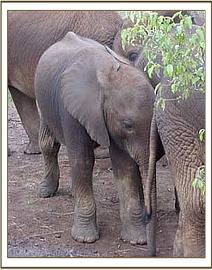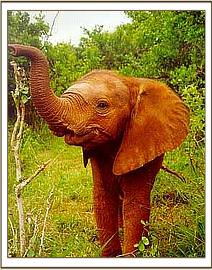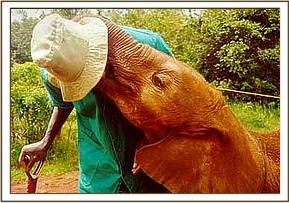



Has fully embraced her wild life in Tsavo East National Park
Current age
24 years old
Gender
Female
Rescued date
12 October 2001
Rescue location
Samburu, Sera Conservancy
Date of birth (estimate)
1 September 2001
Reason orphaned
Found in erosion gulley
Age at rescue
1 month old (approx)
Current location
Living Wild
We were told by the pilot, Phil Mathews, that she had been rescued by Ian Craig of Lewa Downs from a deep depression in a natural rock water catchment known as Kasima Hamisi. Ian Craig’s party were there to discuss another community wildlife related project with the local people when they heard faint wails that at first they could not identify. Further investigation revealed the tiny head of an elephant calf just managing to keep above the water level. They believe that she had been in the “well” probably for two days, unable to touch the bottom, but managing somehow to keep afloat, desperately clinging to life.
This same place had apparently trapped another calf a couple of years earlier who had been successfully reunited with her elephant family. The baby was extracted from the hole and deposited by the Helicopter near an elephant herd spotted from the air earlier, but sadly the Matriarch reacted violently, tossing the calf away, whilst another member of the herd attempted to kneel on her. Clearly this particular herd would reject, and even possibly kill, this baby – unusual elephant behaviour in a psychologically stable population, but not unusual where the elephants have long been subjected to persecution by humans and are themselves constantly in a state of high alert.
The calf was retrieved and from then on, treated as an orphan. Ian Craig requested that she be named “Seraa”, the name of the location in which she was orphaned.
Here in the Nairobi Nursery, the reception little Seraa received from the other orphaned elephants was warm, tender and loving. They all came along to have a look and welcome the new baby before themselves going into their stables for the night. Then, “Nasalot”, upon hearing the calf cry, insisted on being let out again so that she could reassure herself that the distress was not emanating from one of “her” favourite Nursery babies – i.e. Mweya, Sweet Sally or little Thoma. With tail up and ears out she hurried round to their night stables, and having satisfied herself that each one was fine, rushed back to where the baby was with her new Keepers. We let her in, and immediately the newcomer calmed down, as Nasalot rumbled a loving greeting, and gentled the baby all over. Having spent about 10 minutes with her, Nasalot was then happy to return to her stable, confident that the baby was in safe hands with her new Keepers. As for little Seraa, very soon she was comfortable with her Keepers, taking re-hydration fluids and milk, and during her first night, unlike Sweet Sally and Thoma, slept soundly. Come the morning, the Keepers felt that perhaps she should stay put for a while. However, the two older orphans, Nasalot and Mulika had other ideas. Bellows from the bush indicated that they were wondering why Seraa was not with them, and back they came, to collect her!
We were told by the pilot, Phil Mathews, that she had been rescued by Ian Craig of Lewa Downs from a deep depression in a natural rock water catchment known as Kasima Hamisi. Ian Craig’s party were there to discuss another community wildlife related project with the local people when they heard faint wails that at first they could not identify. Further investigation revealed the tiny head of an elephant calf just managing to keep above the water level. They believe that she had been in the “well” probably for two days, unable to touch the bottom, but managing somehow to keep afloat, desperately clinging to life.
This same place had apparently trapped another calf a couple of years earlier who had been successfully reunited with her elephant family. The baby was extracted from the hole and deposited by the Helicopter near an elephant herd spotted from the air earlier, but sadly the Matriarch reacted violently, tossing the calf away, whilst another member of the herd attempted to kneel on her. Clearly this particular herd would reject, and even possibly kill, this baby – unusual elephant behaviour in a psychologically stable population, but not unusual where the elephants have long been subjected to persecution by humans and are themselves constantly in a state of high alert.

View diary updates from across all our orphan units as written by the Keepers

In December 2018, many of our wild-living orphans, ably led by Emily, returned closer to home in the wet season. Included in their herd were some of the younger now independent orphans too!
Solar is Seraa's first wild born calf. We met him for the first time just days after his birth, when Seraa brought him along to the Voi stockades. His nanny is Wasessa who always keeps a watchful eye over her little charge. Read more
By adopting, you play a vital role in the life of an orphaned elephant, rhino, or giraffe — helping us provide the round-the-clock, loving attention each one needs and deserves over many years, so they can ultimately reclaim their place in the wild.
Your adoption supports the 100+ orphans in our care at any given time, covering the cost of milk and food supplies, Keepers' salaries, veterinary treatment, and other essentials.

Celebrate your adoption with a personalised certificate, ready for you or your lucky gift recipient to print and display!

Each month, we send a detailed update about our Orphans’ Project direct to your email inbox, featuring photos, stories, and special highlights.

From the latest Keepers’ Diaries to a downloadable image gallery and more, adopters have exclusive access to our content library.


